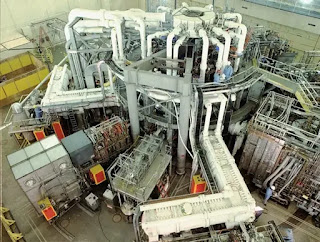Ascientist by the name of Charles Buhler claims that he and a group of scientists and engineers have developed a device that defies the laws of physics in that it can propel itself without a propellant.
Buhler, who’s the co-founder of Exodus Propulsion Technologies and a NASA electrostatics expert, says that his team has been exploring “propellantless propulsion” for many years.
Their work, which began in 2016, has now culminated with the development of a device that has the potential to revolutionize transportation as we know it.
I've got a lot of time and energy invested in learning the natural laws, but I
would welcome a modification that would allow this. On the other hand, if I
had a revolutionary idea that would overturn much of physics, somehow, I don't
see Glenn Beck's Blaze as the place tout it.
The video doesn't say much about the power requirements of the the proposed
system. Does it require electrical energy inputs on the order of rockets to
lift a body into space? That's going to be a long, thick extension cable...
 |
| The Tokamak Fusion Test Reactor |
As issues of climate change and energy security are becoming increasingly salient, the promise of an apparently "clean", "abundant" and "safe" energy source, such as fusion, is ever more appealing.
In response, the fusion industry is growing rapidly and the trope that fusion is "30 years away and always will be" is beginning to lose credibility as the technology moves beyond its experimental stage.
But it's too easy to generate hype around a seemingly ideal solution to societal challenges – and I would argue that the realisation of fusion energy may come into tension with the issues it proposes to solve.
Contextualising this hype and exploring areas where these tensions may arise is critical to ensuring the technology develops in an ethically sound way and can provide net societal benefit if it proves viable.
In short, the environment, women and minorities hurt worse:
But these benefits may mask deeper ethical questions around the development of the technology and some potentially detrimental impacts. Perhaps one of the clearest instances of such a tension arises over environmental sustainability. This applies particularly to the association with climate change mitigation and the reduction of greenhouse gas emissions.
Climate change is an issue that lends itself to the "techno-fix" approach – in other words, it can be tempting to avoid making important changes to our behaviour because we think we can depend on technology to fix everything. This is known as the "mitigation obstruction" argument.
Squaring greenhouse gas emissions with energy demand also raises questions of justice and equity. Energy demand is growing in certain regions, primarily the global south, that have contributed the least to the current climate crisis. Yet fusion programmes are overwhelmingly based in the global north. So if fusion proves viable, those with access to such a transformative technology are not necessarily those who will need it most.
 |
| ST40 compact spherical tokamak |
Similar concerns can be found in the materials used for fusion energy. These include critical minerals, including lithium, tungsten and cobalt. Extraction and processing of these minerals emits greenhouse gases. In some cases, extraction operations are located on or near the lands of indigenous peoples. And the supply chains for these materials are embedded in geopolitical tensions, with alliances, collaboration, competition and the potential for monopolies forming.
Mercury, for example, is used in the processing of lithium for fusion reactors. Not only is the element environmentally damaging and toxic but depends largely on Chinese production.
The accelerating pace of fusion energy increases the risk of overlooking these potential hazards along the way. However, I would say this is not a case where we need to apply moral brakes, but rather shift gear. Approaching these potential ethical tensions requires systematic thought throughout the development process, from thinking about the implications of design decisions and materials choices, through to equitable deployment strategies and knowledge sharing.
Is it any wonder fusion is the fuel of the future, forever?
The Wombat has Rule 5 Sunday: Outstanding In Her Field garnering clicks at The Other McCain.


No comments:
Post a Comment